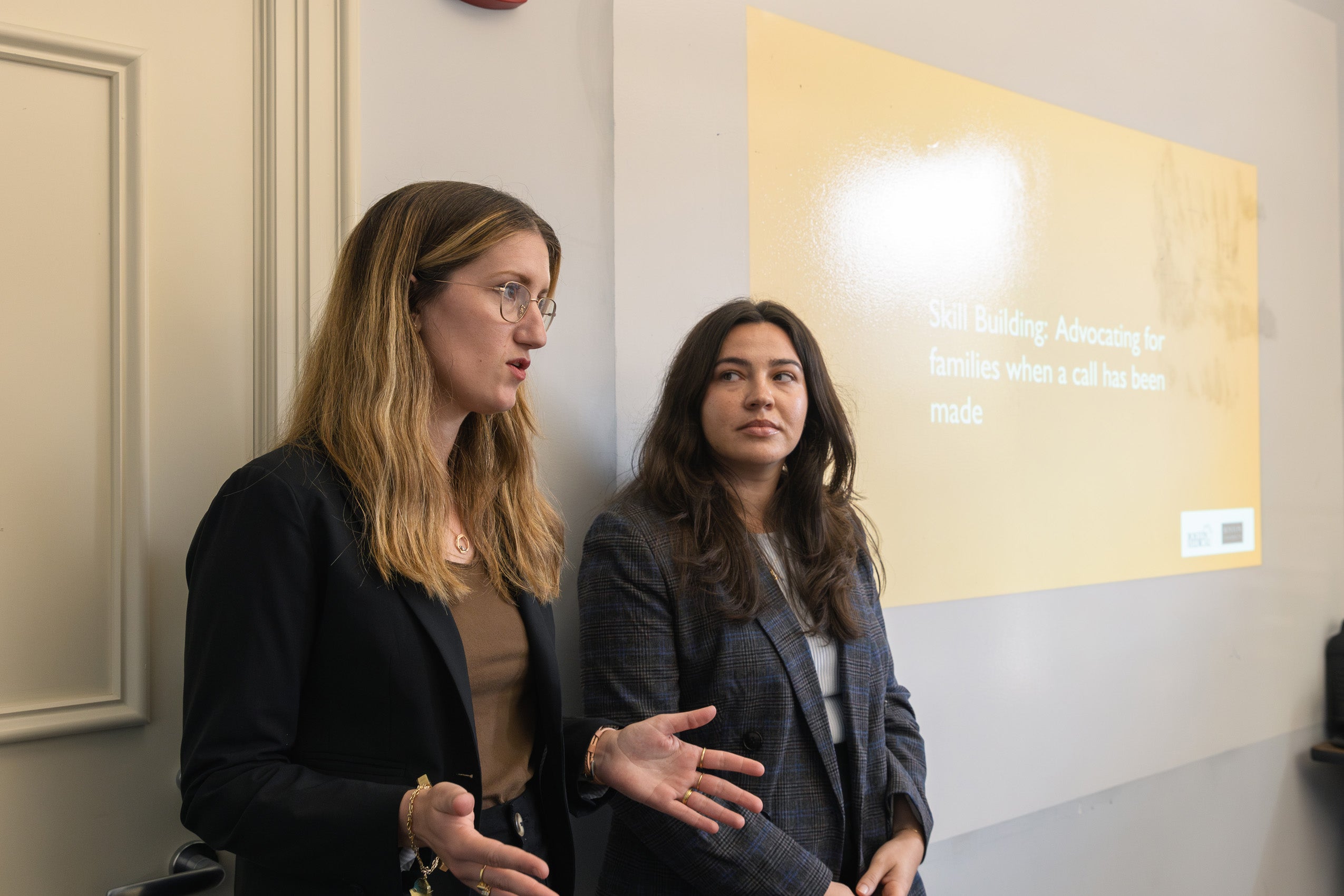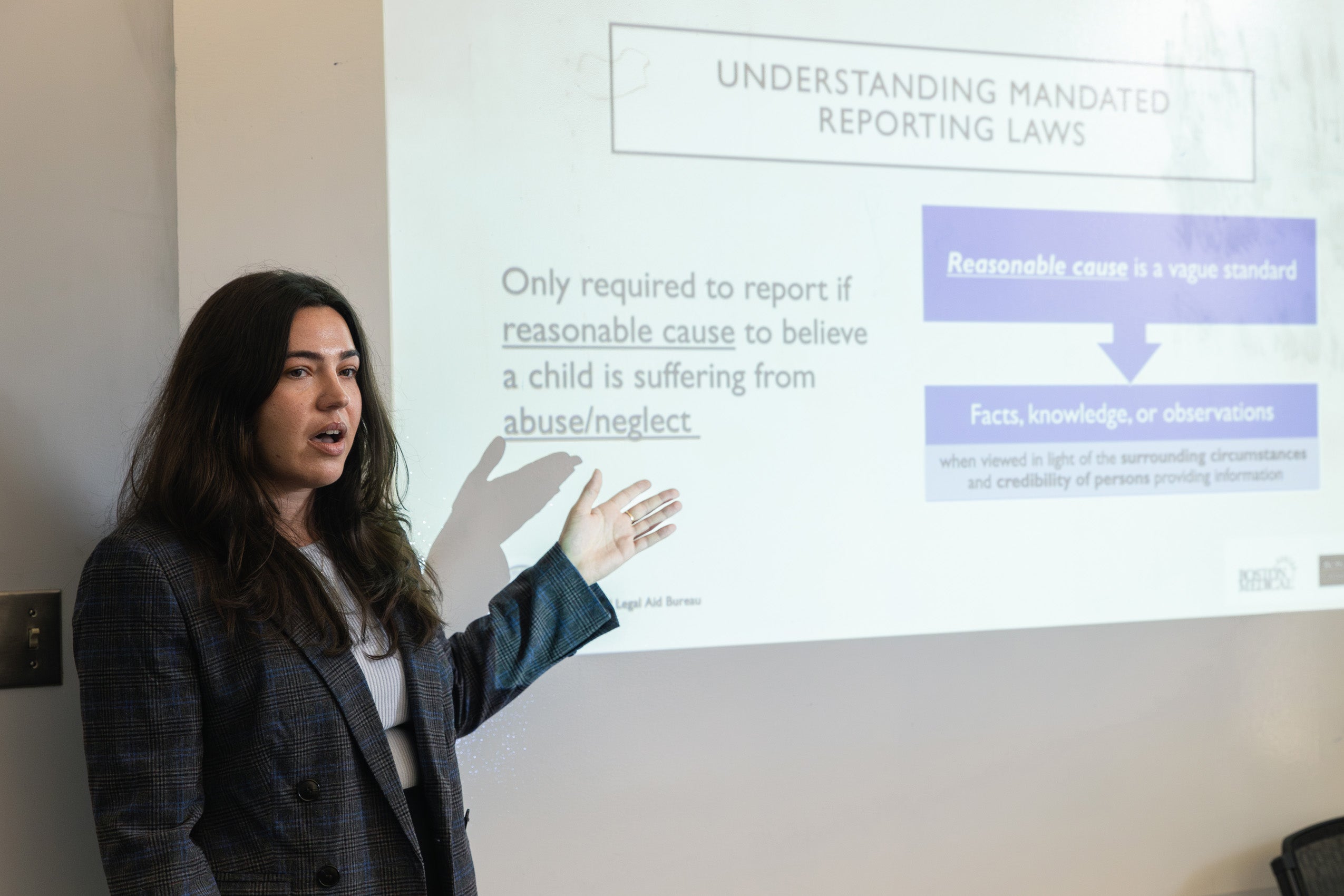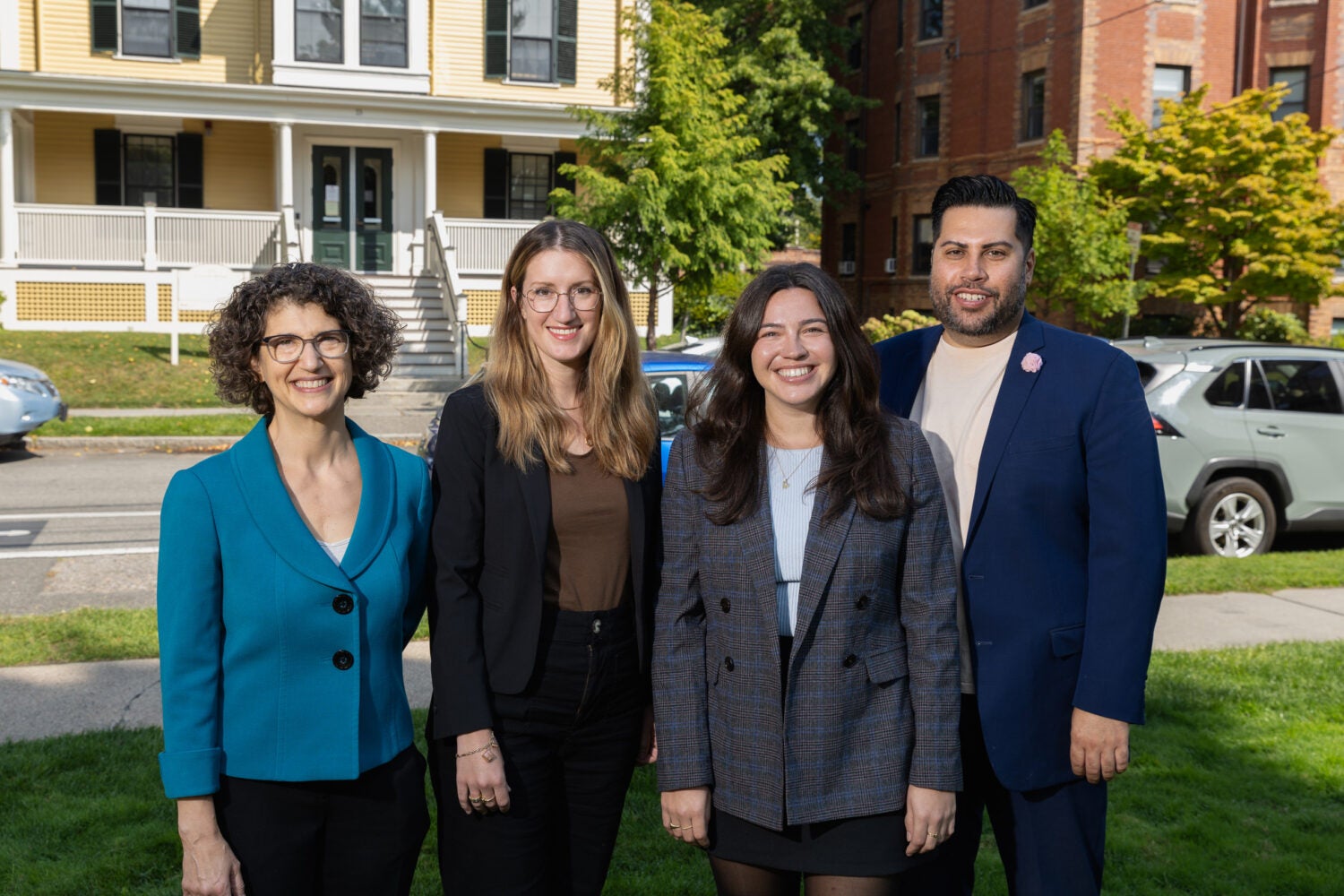A young mother opens her door to find a Department of Children and Families, or DCF, investigator standing there, ready to inspect her home and interview her children. Unbeknownst to her, a call was made to DCF by the emergency department, where she had taken her child after a fall on the playground the week prior. Panic sets in as she realizes she doesn’t know her rights or how to protect her family. This scenario plays out daily across Massachusetts, often leaving families feeling powerless and resulting, in some cases, in the wrongful separation of parents and children. A pioneering program at the Harvard Legal Aid Bureau aims to change that dynamic by educating mandated reporters, those on the front lines of the DCF reporting process.
In partnership with the Boston Medical Center and led by the legal aid bureau’s alumna and current clinical fellow Erin Hegarty ’24 — alongside clinical instructors Jacob Chin, Elizabeth Tuttle Newman ’16, and Stephanie Goldenhersh — the organization led by Harvard Law students is offering a medical-legal partnership and training program to medical residents at the hospital, aiming to educate them on their legal responsibilities as mandated reporters, and the universe of resources available to struggling families. Through this partnership, both the hospital and the aid bureau hope to minimize unwarranted DCF involvement in Massachusetts families’ lives and to support families when reporting does happen.
The training program is a product of the bureau’s Family Defense Practice, launched in 2022 as part of its larger Family Practice, that seeks to intervene early when the state becomes involved with families. Through partnerships with medical institutions and community organizations, Harvard Law students are now working to reform how mandated reporters approach suspected abuse or neglect. The legal aid bureau’s collaboration with Boston Medical Center began in 2023, when Vandana Apte ’23 co-led a training for medical residents there and at Children’s Hospital on the potential harms of DCF’s child protection system and the laws underpinning mandated reporting in Massachusetts.
“The vast majority of cases that come into this family policing system are called in by mandated reporters,” says Tuttle Newman. “In Massachusetts, a large share of mandated reporters who are calling in cases are teachers and medical professionals,” many of whom lack substantive training on what constitutes abuse or maltreatment. Leaving this determination to individuals untrained on the law can lead to overreporting and racial disparities, she says.
Often, she adds, issues related to poverty are wrongfully reported as abuse due to a lack of knowledge of the legal definition of neglect. “In Massachusetts, the laws are clear that poverty in and of itself is not neglect, and that should not be a reason that a case is called in,” she explains. Poverty accounts for the vast majority of cases that are called into the system, according to Tuttle Newman, whether it’s someone who is experiencing homelessness or someone who can’t make it to a specialist appointment because they lack transportation.
To address this issue, the legal aid bureau developed its training in partnership with the medical center to help medical professionals and resident students better understand the legal standards and potential consequences of filing a DCF report.
Dr. Ariana Witkin is a pediatrician and director of the Leadership in Equity & Advocacy residency track at Boston Medical Center who collaborated with Harvard Law students on the training. “I felt like under our current ‘child protection system,’ we really only empower the state and not the family,” she says. “If truly our job is to try to be impartial, we should be equally empowering the state and families.”


The training aims to “educate them on the legal definitions of abuse and neglect, give them concrete skills in assessing family strengths and creative alternatives to the family policing system, and provide needed context on harms within the system,” Tuttle Newman explains.
Hegarty, who led the development of the training as a student, describes the process: “We met with many folks at BMC, including doctors, social workers, and members of their child protection team. Over the course of about two months, we established the big takeaways that we wanted residents to walk away with given the limited time frame.”
The program is one initiative in a broader movement that aims to break down historical silos between the medical and legal professions. Tuttle Newman believes mutual understanding is crucial: “For us as attorneys, understanding a lot more about the nuts and bolts of how medical professionals work is incredibly useful. And for them, as medical professionals, it’s important to understand how the laws work, what this system actually does, what its harms are, what it means when you call in a case.”
“The value of this collaborative effort is this idea that we’re both coming from different ends of the same problem,” says Hegarty. “As lawyers, we represent families who have come into this really harmful system. And on the other end, doctors and teachers are the ones who are legally tasked with the decision of deciding, ‘do I make a call, or do I not make a call’.”
Witkin echoes this sentiment: “I think it’s important to have a multidisciplinary model, because our work informs each other, and often we’re siloed into these different academic spheres.”
The first training session happened in early 2024, spearheaded by Hegarty in her final semester as a student in HLAB. Hegarty gave the presentation to a room full of medical residents and doctors, providing concrete skills for these mandated reporters to use when assessing potential cases.
Clinical instructor Jacob Chin adds that the training also focuses on identifying family strengths, even in challenging situations. “One concrete skill we highlighted is where [mandated reporters] can highlight strengths of a family in the report itself, even if they or their social worker or nurse is going to call it in,” he explains.
“This skill is important because when the filing comes from a physician, in my experience, DCF puts a lot of weight into it,” says Witkin. “Our words really do have a lot of power.”
The training also aims to dispel common misconceptions about the child protection system and to provide context on the full consequences of involving DCF in families’ lives, from the sobering statistics about outcomes for children placed in foster care to significant delays in the court system tasked with adjudicating claims of abuse or and neglect. Tuttle Newman says, “Here in Massachusetts, once the state separates families, it can take months for parents to even have their day in court to defend themselves or contest the removal, even if they have meritorious claims or did not neglect or abuse their children.”
To help people understand the gravity of family separation, Chin uses an exercise in trainings: “Imagine a child is being harmed in your own family, when maybe you have a relative who’s struggling with substance abuse, and their child has been neglected. Would you want the state to come in and just take your nephew or niece, and you never see them again? Or would you want to get together as a family to decide who can help this child? We’re talking about creating these types of alternate paths. We’re not there yet. But if you can humanize it and think about it in your own context, would you really want a government agent to show up and just take a loved child away from your family?”
The legal aid bureau’s family defense work goes beyond training mandated reporters. It also provides direct legal representation to families involved with DCF.
“Family defense has long been a natural sub-practice in domestic relations cases, arising when survivors of domestic violence are accused of neglect when abuse occurs in the child’s presence,” says Goldenhersh. “Expanding further into the field allows our Family Practice to meet the broader needs of our client community and help more families.”
As a student, Hegarty’s work on client cases gave her a deep understanding of the nuances involved in early family defense work. “A huge part of my work in family defense was realizing the different ways that lawyering can happen and the role that a lawyer has to play in all of those spaces.”
“Here in Massachusetts, once the state separates families, it can take months for parents to even have their day in court to defend themselves or contest the removal, even if they have meritorious claims or did not neglect or abuse their children.”
Elizabeth Tuttle Newman
To expand the practice’s reach, Hegarty has returned to HLAB through her post-graduate fellowship to continue building out the medical-legal partnership and community outreach efforts. “We’re so excited that Erin is joining us next year,” says Tuttle Newman. “As a student, she was a leader in envisioning and building out our family defense work.”
Looking ahead, Hegarty plans to expand the training program: “I’m really looking forward to this next year, building it out the training and thinking about how we can capitalize on that joint effort of education.” She envisions longer, more in-depth training sessions and more opportunities for collaboration between legal and medical professionals.
Witkin, at Boston Medical Center, says she also looks forward to continuing the collaboration: “We would love to make the session into a full day training that’s required for all residents to go through. We could even include some concrete experiences, either in a courthouse or shadowing some of the attorneys. Vice versa, we could have law students shadow some of our residents to really operationalize some of the skills that they’re learning.”
In addition to the medical partnership, the legal aid bureau is also building community-based partnerships to provide know-your-rights education and raise awareness about DCF. They’ve started working with La Colaborativa, a nonprofit in Chelsea that supports the Latinx community. “They’re a phenomenal group, they do so much in the community, and we are thrilled to be able to provide resources on this issue,” says Hegarty.
Hegarty sees this community-based work as crucial: “I think collaborating with existing community partners is so important, because the reality is that so many people are impacted by the family policing system. There’s a huge need in the communities that we’re already working in to provide our support and services.”
Want to stay up to date with Harvard Law Today? Sign up for our weekly newsletter.
